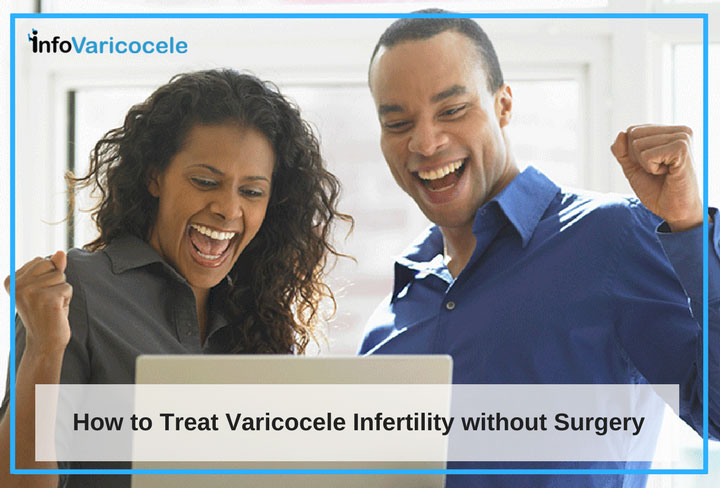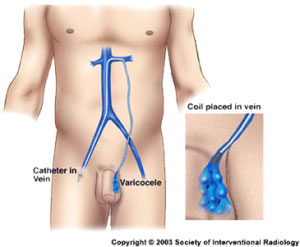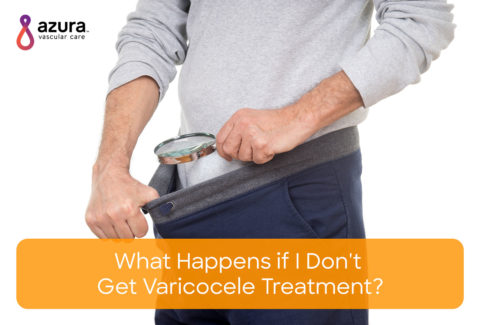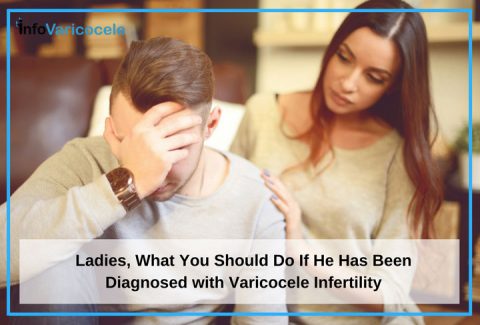
A varicocele is a network of varicose veins that develop in the scrotum. This occurs as a result of a failure of the valves within the veins that return blood from the testicles back to the systemic circulation. This valve failure causes the pressure to rise in the abnormal veins, resulting in varicocele formation. Varicocele occurs in about 15%-17% of men and about 40% of infertile men.i
RELATED: Read more about varicoceles
The treatment of varicocele infertility without surgery is an option that minimizes many of the typical complications related to surgical treatment of this condition such as reaction to general anesthesia, bleeding, and infection. A surgical approach to varicocele management increases the risk of hydrocele formation (a build-up of fluid and swelling of the scrotum).
Luckily, there are alternatives to varicocele surgery.
Varicocele Embolization – An Alternative to Varicocele Surgery
 Varicocele embolization is a minimally invasive treatment option used to treat varicocele infertility without surgery. This outpatient, image-guided procedure uses a catheter, which is inserted into a vein through a small nick in the skin, usually in the groin or the neck, to redirect blood flow away from the varicocele. Small metal coils are placed into the catheter and fed into the affected veins in the scrotum. The coils block the abnormal veins, reducing pressure on the varicocele, resulting in the reduction in size of the varicose veins.
Varicocele embolization is a minimally invasive treatment option used to treat varicocele infertility without surgery. This outpatient, image-guided procedure uses a catheter, which is inserted into a vein through a small nick in the skin, usually in the groin or the neck, to redirect blood flow away from the varicocele. Small metal coils are placed into the catheter and fed into the affected veins in the scrotum. The coils block the abnormal veins, reducing pressure on the varicocele, resulting in the reduction in size of the varicose veins.
What You Need to Know About the Procedure
Varicocele embolization may improve symptoms such as pain, inflammation, and enlarged scrotal veins. Even if you have no symptoms, varicoceles can lower a man’s sperm count and undermine the quality of his sperm, contributing to infertility. In some cases, the testicles may shrink.
Benefits of Varicocele Embolization
There are several benefits of treatment by varicocele embolization rather than varicocele surgery:
- No surgical incision.
- As effective as surgery, as measured by improvement in semen analysis and pregnancy rates.
- Patients can return to normal daily activities immediately and without requiring hospitalization; varicocele surgery requires several weeks’ recovery and may require hospitalization.
- The rare patient who has varicoceles on both sides can have them treated simultaneously through one vein puncture site; surgery on both sides requires two separate incisions.
- No general anesthesia required.
- No sutures.
- Reduced risk of infection.
- Cost effective.ii
Tips for Post Procedure Recovery
Even though this is a minimally invasive, safe procedure, there are a number of things you can do to minimize the risk for post-procedural complications:
Avoid Aspirin
Aspirin thins your blood, and may increase the risk for post-procedure bleeding. Patients taking (cardio protective) aspirin should discuss this with their prescribing doctor before discontinuing. The interventional radiologist performing the embolization may request that aspirin therapy be discontinued a few days prior to the procedure to help decrease the risk for intra and post-procedural bleeding.
Monitor For Allergic Reactions
While the risk is low, the contrast agent used during varicocele embolization may cause an allergic reaction in a small percentage of patients. If after the varicocele embolization you experience a rash, itching, hives, or trouble breathing, you should seek emergency medical attention. These signs may be due to an unrelated cause, but they may also be the result of a delayed allergic reaction to the contrast agent used during the embolization procedure. If not recognized and treated promptly, it may result in a severe, life-threatening situation.
Watch For Signs of Infection
Although rare, varicocele embolization may result in an infection. Signs of a post-procedure infection may include pain, redness, and inflammation at the catheter insertion site, as well as itching, drainage, or bleeding. Other signs of infection may include fever, chills, nausea, vomiting, and headache. Coughing, difficulty breathing, and dizziness may also develop. Notify your physician at the first sign of infection.
Take Prescribed Pain Medications
Severe pain is not typical after varicocele embolization; however, some patients have reported developing a minor backache. Patients are advised to take any prescribed pain medication as directed. If none have been prescribed, ask your doctor about taking ibuprofen or acetaminophen.
Don’t Smoke
Patients who smoke may be more likely to experience complications after varicocele embolization. Smoking can lead to delayed healing and impaired circulation, and may damage capillaries. If patients are unable to quit smoking prior to the procedure, they should refrain from doing so for a few days after the embolization to help ensure an uneventful recovery.
Non-surgical methods of treating varicocele infertility should be discussed at length with your physician, as some men may not be candidates. While the benefits of varicocele embolization often outweigh the risks, patients need to thoroughly discuss their medical histories, current medications, and desired outcomes with their health care providers so that the best, most appropriate method of treatment can be determined for each individual patient.
Request a consultation now with a doctor in your area to learn more about varicocele embolization as your varicocele treatment option.
Sources:
i Cassidy Dr. D, Jarvi K, Grober E, Lo K. Varicocele surgery or embolization: Which is better? J Can Urol Assoc. 2012;6(4):266–268. doi:10.5489/cuaj.11064.
ii http://www.sirweb.org/patients/varicoceles/


